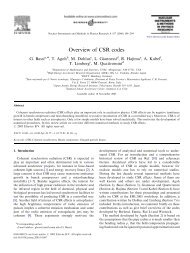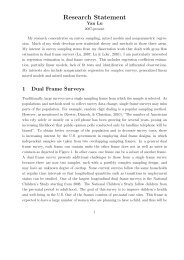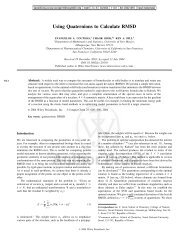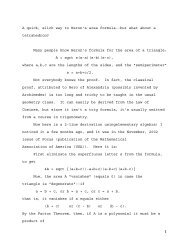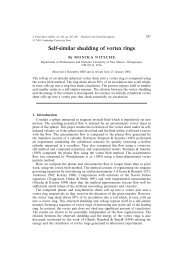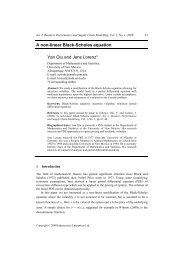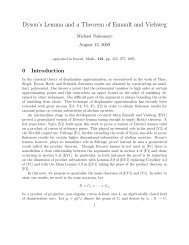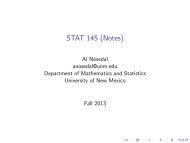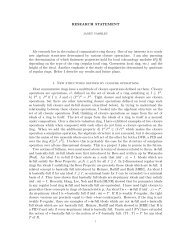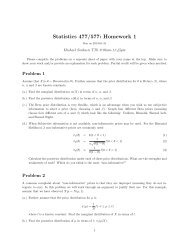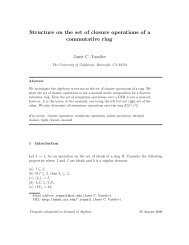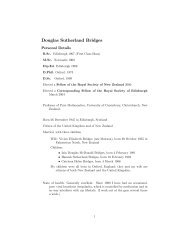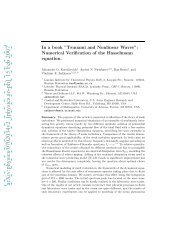OEO Office of Equal Opportunity - Department of Mathematics and ...
OEO Office of Equal Opportunity - Department of Mathematics and ...
OEO Office of Equal Opportunity - Department of Mathematics and ...
You also want an ePaper? Increase the reach of your titles
YUMPU automatically turns print PDFs into web optimized ePapers that Google loves.
142 ARTS AND SCIENCES<br />
Ethnology:<br />
ANTH 130 Cultures <strong>of</strong> the World<br />
ANTH 330 Principles <strong>of</strong> Cultural Anthropology<br />
Human Evolutionary Ecology (HEE):<br />
ANTH 160 Human Life Course<br />
ANTH 360 Human Behavioral Ecology<br />
Linguistic Anthropology:<br />
ANTH 110 Language, Culture <strong>and</strong> the Human Animal<br />
ANTH 310 Language <strong>and</strong> Culture<br />
Majors who select a concentration will take an additional<br />
17 to 18 hours <strong>of</strong> concentration requirements <strong>and</strong> electives.<br />
The student who does not select a concentration must take<br />
the major requirements <strong>and</strong> can take courses in any <strong>of</strong> the<br />
concentrations so long as appropriate prerequisites have<br />
been completed. In either case, 12 <strong>of</strong> the additional 17–18<br />
credits must be upper division (300–400 level). In other<br />
words, there must be a minimum <strong>of</strong> 18 upper division credits<br />
in the major. No more than 6 hours <strong>of</strong> individual study or field<br />
research courses may be applied toward the major.<br />
In addition to fulfilling the general curriculum <strong>and</strong> unit distribution<br />
requirements for the B.A. degree, students desiring<br />
a B.S. degree must concentrate (see below) in archaeology,<br />
biological anthropology or human evolutionary ecology,<br />
including an advanced laboratory course or summer field<br />
school <strong>of</strong> at least 4 credits in the major or the minor. To complement<br />
the B.S. in anthropology, students must also take at<br />
least 6 hours <strong>of</strong> mathematics (as approved for A&S group<br />
requirements) <strong>and</strong> have a minor in or distributed among<br />
astrophysics, biochemistry, biology, chemistry, computer science,<br />
earth <strong>and</strong> planetary science, mathematics, geography,<br />
psychology or physics.<br />
The <strong>Department</strong> <strong>of</strong> Anthropology encourages anthropology<br />
majors to take a creative <strong>and</strong> self-motivated approach to<br />
their education. In close consultation with an advisor, majors<br />
may utilize upper level (300-400 level) electives from multiple<br />
concentrations to complete the elective requirements <strong>of</strong> any <strong>of</strong><br />
the five concentrations. In any case all students interested in<br />
majoring or minoring in anthropology are urged to consult with<br />
one <strong>of</strong> the department undergraduate advisors as early in their<br />
academic careers as possible.<br />
Concentrations<br />
Archaeology (36 Credits)<br />
For a concentration in archaeology take:<br />
ANTH 101 (3 credits)<br />
ANTH 121L (4 credits)<br />
ANTH 220 (3 credits)<br />
ANTH 320 (3 credits)<br />
Students must also take one additional course from each <strong>of</strong><br />
three groups (A, B, C) for a total <strong>of</strong> at least 9 credits:<br />
Group A: Technical (ANTH 372, 373, 375, 421, 473L)<br />
Group B: Europe, Asia, Africa (ANTH 325, 326, 327,<br />
328, 329)<br />
Group C: North <strong>and</strong> South America (ANTH 321, 322,<br />
323, 324, 329)<br />
ANTH 420 may be applied to the above groups, depending<br />
on topic.<br />
In addition, a student must complete one additional core<br />
sequence within anthropology, plus an elective from a third<br />
concentration, plus elective credits to complete the minimum<br />
<strong>of</strong> 36 credits in anthropology.<br />
Biological Anthropology (36 Credits)<br />
For a concentration in biological anthropology take:<br />
ANTH 101 (3 credits)<br />
ANTH 150 (3 credits)<br />
ANTH 151L (1 credit)<br />
ANTH 350 (3 credits)<br />
ANTH 351L (4 credits)<br />
Plus two upper division courses (300–400 level) in biological<br />
anthropology (may include ANTH 363 or other HEE courses<br />
with approval). (6–8 credits).<br />
In addition, a student must complete one additional core<br />
sequence within anthropology, plus an elective from a third<br />
concentration, plus elective credits to complete the minimum<br />
<strong>of</strong> 36 credits in anthropology.<br />
Ethnology (36 Credits)<br />
For a concentration in ethnology take:<br />
ANTH 101 (3 credits)<br />
ANTH 130 (3 credits)<br />
ANTH 330 (3 credits)<br />
Plus two area courses (from ANTH 331, 332, 337, 343, 345,<br />
384, 387) <strong>and</strong> two topics courses (from ANTH 312, 333, 344,<br />
346, 389).<br />
ANTH 340 may be included above, depending on subject<br />
matter.<br />
In addition, a student must complete one additional core<br />
sequence within anthropology, plus an elective from a third<br />
concentration, plus elective credits to complete the minimum<br />
<strong>of</strong> 36 credits in anthropology.<br />
Human Evolutionary Ecology (HEE) (36 Credits)<br />
For a concentration in HEE take:<br />
ANTH 101 (3 credits)<br />
ANTH 160 (3 credits)<br />
ANTH 161L (1 credit)<br />
ANTH 360 (3 credits)<br />
ANTH 462 (3 credits)<br />
Plus two elective courses in Human Evolutionary Ecology<br />
(6 credits).<br />
In addition, a student must complete one additional core<br />
sequence within anthropology, plus an elective from a third<br />
concentration, plus elective credits to complete the minimum<br />
<strong>of</strong> 36 credits in anthropology.<br />
Linguistic Anthropology<br />
Students with a particular interest in linguistic anthropology<br />
should combine a concentration in one <strong>of</strong> the other concentrations<br />
(e.g., Ethnology or HEE) with a Minor in Linguistics.<br />
They should include in their programs both LING 292<br />
(Linguistic Analysis) <strong>and</strong> ANTH 310 (Language <strong>and</strong> Culture).<br />
It is highly recommended that such students consult with an<br />
advisor in linguistic anthropology early in their program.<br />
Courses with similar content to 110, 292, 310, 317, 318, 413<br />
<strong>and</strong> 416 are cross-listed by the <strong>Department</strong> <strong>of</strong> Linguistics.<br />
Students may obtain credit for these courses in only one<br />
department; credits from either department may be applied<br />
toward the anthropology major degree requirements.<br />
Minor Study Requirements<br />
(21 credits)<br />
A total <strong>of</strong> 21 hours, including 101 <strong>and</strong> at least one <strong>of</strong> the<br />
following core curriculum sequences: 110 (or LING 101) <strong>and</strong><br />
310; 220 or 121L, <strong>and</strong> 320; 130 <strong>and</strong> 330; 150 <strong>and</strong> 350; or 160<br />
<strong>and</strong> 360. No more than 3 hours <strong>of</strong> field or problem courses<br />
(399, 497, 499) or 12 hours <strong>of</strong> lower division (100–200 level)<br />
courses may be applied toward the minor. Alternatively, a<br />
student may select a distributed minor focusing on anthropology.<br />
Distributed Minors Outside<br />
Anthropology (30–36 credits)<br />
Anthropology majors with interdisciplinary interests may plan<br />
a variety <strong>of</strong> possible distributed minors designed as preparation<br />
for diverse pr<strong>of</strong>essional or educational goals. These<br />
UNM CATALOG 2006–2007 Symbols, page 611.



